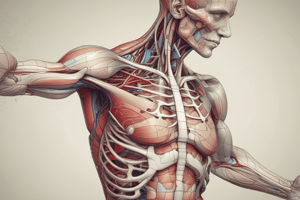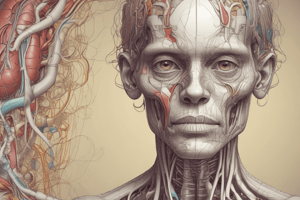Podcast
Questions and Answers
What is the primary function of the Integumentary System?
What is the primary function of the Integumentary System?
- To filter waste and excess fluids from the blood
- To move the body and maintain posture
- To protect the body from external damage (correct)
- To provide support, protection, and movement
What type of muscle tissue is responsible for involuntary movement?
What type of muscle tissue is responsible for involuntary movement?
- Smooth muscles (correct)
- Epithelial tissue
- Skeletal muscles
- Cardiac muscles
How many bones are in the adult human skeleton?
How many bones are in the adult human skeleton?
- 200 bones
- 206 bones (correct)
- 210 bones
- 215 bones
What is the function of the Urinary System?
What is the function of the Urinary System?
What is the name of the cavity that contains the brain?
What is the name of the cavity that contains the brain?
What type of tissue allows for movement and contraction?
What type of tissue allows for movement and contraction?
Which system is responsible for interpreting and responding to stimuli?
Which system is responsible for interpreting and responding to stimuli?
What is the main function of the Circulatory System?
What is the main function of the Circulatory System?
Which part of the Respiratory System is responsible for exchanging oxygen and carbon dioxide?
Which part of the Respiratory System is responsible for exchanging oxygen and carbon dioxide?
What is the primary function of the Small Intestine in the Digestive System?
What is the primary function of the Small Intestine in the Digestive System?
Which system produces and regulates hormones in the body?
Which system produces and regulates hormones in the body?
Flashcards are hidden until you start studying
Study Notes
Organ Systems
- Nervous System: controls body functions, interprets and responds to stimuli
- Central Nervous System (CNS): brain, spinal cord
- Peripheral Nervous System (PNS): nerves, ganglia
- Circulatory System: transports oxygen, nutrients, and waste products
- Heart: pumps blood
- Blood vessels: arteries, veins, capillaries
- Respiratory System: brings oxygen into the body, removes carbon dioxide
- Lungs: exchange oxygen and carbon dioxide
- Trachea, bronchi, diaphragm: facilitate breathing
- Digestive System: breaks down and absorbs nutrients
- Mouth: mechanical and chemical digestion
- Stomach: chemical digestion
- Small intestine: nutrient absorption
- Large intestine: water absorption, waste elimination
- Endocrine System: produces and regulates hormones
- Glands: pituitary, thyroid, adrenal, pancreas, etc.
- Integumentary System: protects the body from external damage
- Skin: epithelial tissue, sweat glands, hair follicles
- Associated organs: nails, hair, exocrine glands
- Muscular System: moves the body, maintains posture
- Skeletal muscles: voluntary movement
- Smooth muscles: involuntary movement
- Cardiac muscles: heart function
- Skeletal System: provides support, protection, and movement
- Bones: 206 bones in the adult human skeleton
- Joints: connect bones, allow for movement
- Urinary System: filters waste and excess fluids from the blood
- Kidneys: filter waste and excess fluids
- Ureters: transport urine to the bladder
- Bladder: stores urine
- Urethra: eliminates urine from the body
Body Regions
- Head: contains the brain, sensory organs, and facial features
- Neck: connects the head to the torso
- Torso: contains the chest and abdominal cavities
- Upper limb: arm, forearm, hand
- Lower limb: thigh, leg, foot
- Back: posterior region of the torso
Body Cavities
- Cranial cavity: contains the brain
- Thoracic cavity: contains the lungs, heart, and major blood vessels
- Abdominal cavity: contains the digestive organs
- Pelvic cavity: contains the reproductive organs
Tissue Types
- Epithelial tissue: forms the lining of organs, glands, and body surfaces
- Connective tissue: supports and connects other tissues
- Muscle tissue: allows for movement and contraction
- Nervous tissue: transmits and interprets signals
Organ Systems
- Nervous System: interprets and responds to stimuli
- Divided into Central Nervous System (brain, spinal cord) and Peripheral Nervous System (nerves, ganglia)
- Circulatory System: transports oxygen, nutrients, and waste products
- Heart pumps blood through arteries, veins, and capillaries
- Respiratory System: exchanges oxygen and carbon dioxide
- Lungs facilitate gas exchange, with trachea, bronchi, and diaphragm aiding breathing
- Digestive System: breaks down and absorbs nutrients
- Involves mechanical and chemical digestion in the mouth, stomach, and small intestine
- Absorbs nutrients in the small intestine and absorbs water in the large intestine
- Endocrine System: produces and regulates hormones
- Includes glands such as pituitary, thyroid, adrenal, pancreas, etc.
- Integumentary System: protects the body from external damage
- Skin consists of epithelial tissue, sweat glands, and hair follicles
- Muscular System: moves the body and maintains posture
- Skeletal muscles enable voluntary movement, smooth muscles enable involuntary movement, and cardiac muscles control heart function
- Skeletal System: provides support, protection, and movement
- Comprises 206 bones in the adult human skeleton, with joints connecting bones
- Urinary System: filters waste and excess fluids from the blood
- Kidneys filter waste, ureters transport urine to the bladder, and the urethra eliminates urine
Body Regions
- Head: contains brain, sensory organs, and facial features
- Neck: connects head to torso
- Torso: contains chest and abdominal cavities
- Upper limb: consists of arm, forearm, and hand
- Lower limb: consists of thigh, leg, and foot
- Back: posterior region of the torso
Body Cavities
- Cranial cavity: contains brain
- Thoracic cavity: contains lungs, heart, and major blood vessels
- Abdominal cavity: contains digestive organs
- Pelvic cavity: contains reproductive organs
Tissue Types
- Epithelial tissue: forms lining of organs, glands, and body surfaces
- Connective tissue: supports and connects other tissues
- Muscle tissue: enables movement and contraction
- Nervous tissue: transmits and interprets signals
Studying That Suits You
Use AI to generate personalized quizzes and flashcards to suit your learning preferences.




